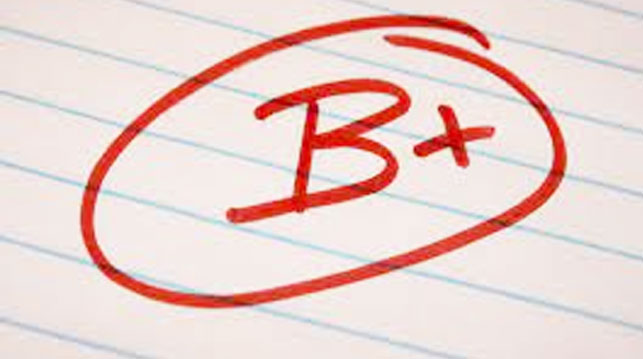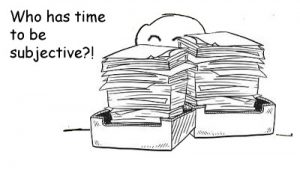
There are a lot of myths about school, like being able to leave the classroom with impunity if the teacher is ten minutes late and the one about what the meatloaf is made of.
One myth popular in high school and college is that multiple-choice and short-answer tests are “more objective” than essay assignments. Students love to claim that teachers “are so subjective” or “just go with what they like” when grading papers, rather than acknowledging the simple truth that expressing one’s knowledge in an essay is more difficult than filling in a bubble or jotting down a sentence or two. And this difficulty isn’t just because there are more words involved, but because the quality and thoroughness of students’ answers and insights are supposed to be higher in an essay than in short-answer/multiple-choice tests.
Get a free sample proofread and edit for your document.
Two professional proofreaders will proofread and edit your document.
 Is there subjectivity in paper grading? Yes, of course. But there is subjectivity in all grading. Tests are subjective in the way they ask questions, the questions they ask, the depth of knowledge they require, and, of course, the selection of the “right” answer. Sure, the question, “How many protons are in an oxygen molecule?” with its answer, “10,” is about as objective as it gets, but that’s because of the content, not the format. If a test in the same format asks, “Who is responsible for the US real estate crash of 2008?” and its “correct” answer is, “People who don’t have jobs,” that’s about as subjective as it gets.
Is there subjectivity in paper grading? Yes, of course. But there is subjectivity in all grading. Tests are subjective in the way they ask questions, the questions they ask, the depth of knowledge they require, and, of course, the selection of the “right” answer. Sure, the question, “How many protons are in an oxygen molecule?” with its answer, “10,” is about as objective as it gets, but that’s because of the content, not the format. If a test in the same format asks, “Who is responsible for the US real estate crash of 2008?” and its “correct” answer is, “People who don’t have jobs,” that’s about as subjective as it gets.
So, if we recognize that no system of evaluating someone’s knowledge and skills is going to be perfect, we can also see that essay grading is no more subjective than other methods. Unless your teacher is of poor quality (and they do exist, just not as often as some people like to claim), here are four simple, hard-and-fast quality measures that universally apply to grading papers.
Legibility
This one’s pretty simple: the teacher needs to be able to make sense of the paper. Here at ProofreadingPal, we get a lot of clients who aren’t native English speakers (ESL, EFL) who need assistance in this area. Legibility involves not just grammar and format, but also proper use of idioms and other quirks of the language.
Readability
Being easy to read isn’t the same as being legible. Readability is about the organization of ideas and the flow from one thought to another (and one sentence to another). It can be as simple as remembering to stay in active voice. For example, the passively phrased, “The results were used to determine the future value of the tools that would be used,” has much lower readability than, “We used the results to determine the future value of the tools they would use.” Readability also involves complicated issues, such as when the logic of an argument is faulty or the reader is not prepared to understand the paper’s conclusions.
Content
This one’s the most obvious. What the paper says has to be worth reading, and the quality of the content is what truly determines the grade. Legibility and readability must be of good enough quality that the teacher can understand and evaluate the content, but the most beautiful prose in the world isn’t going to get a good grade if the content is worthless. The content needs to be accurate in terms of what the class is about, but remember that if the paper provides for the teacher nothing more than what the teacher provided for the student (i.e., repeats the lectures and textbooks), the quality of the content is not going to get a good grade (let alone an A).
Originality
And that’s where originality comes into it. I’m not talking about plagiarism here, which is more about being a criminal than about grading essays. I’m talking about offering up something that comes from the student, not just repeating the information given in class. An instance of bad-grade-worthiness here would be using an example of something given in class as an example in your paper. Sure, you avoid trouble by acknowledging in your paper that it’s an example from class, but it still doesn’t come from your brain and so gives the teacher nothing to evaluate. Good originality may be quite personal, such as your reaction to a character in a book or your use of personal work experience to shed light on a situation. Good originality may be more empirical, like a logical insight into a social debate or a close reading of a text.
And that’s it, really: legibility and readability, content and originality. If these are good, your grade should be high. If they’re not, well, don’t blame the teacher for being “subjective.”
Julia H.
Get a free sample proofread and edit for your document.
Two professional proofreaders will proofread and edit your document.
Get a free sample proofread and edit for your document.
Two professional proofreaders will proofread and edit your document.
We will get your free sample back in three to six hours!